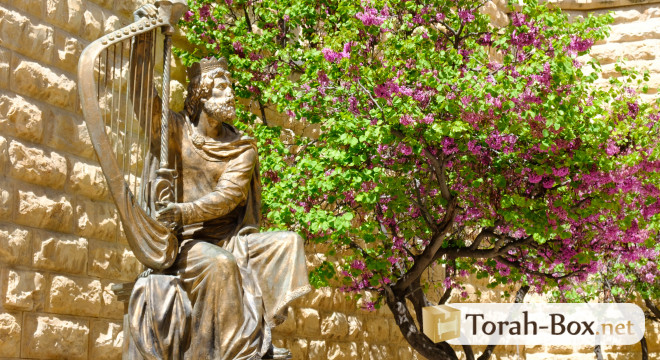
Torah Learning
Tanakh Characters - David and Michal: Modesty Versus Hashem’s Honor
One of the most fascinating encounters in the Book of Shmuel transpires between King David and his wife Michal, daughter of King Saul. David led a procession to bring the Aron Hakodesh (the holy ark) to Ir David. The occasion was one of buoyant celebration. [1] David led the festivities with electrifying dances, inadvertently showing parts of his body in front of the Aron. As the procession entered Ir David, Michal, watching these demonstrative dances, was horrified. She considered the latter dishonorable.
Angry and disgusted, she compulsively left her house and rebuked David publicly, claiming he was acting degradingly before servants and maidservants, and stressing that this attitude was inappropriate for the King of Israel.
David replied that he only danced in honor of Hashem, who had chosen him to be King instead of Michal's father, Saul. He added that he would have humbled himself, even more, to honor Hashem, even if the People had discredited him. According to the Prophets, the incident ended with Michal being punished for having reprimanded David. She did not conceive any more children until the day of her death.
The point to address focuses on an inherent conflict between two people. And more specifically, on the reason, David mentioned to Michal, that he was chosen a king to replace her own father. This point seems to be out of context in the discussion.
In fact, superficially, it might be interpreted as a lack of consideration to mention that Michal's father, Saul, was rejected to become king.
Our commentators explain that Michal embodied the attribute of Tzniut, modesty par excellence. She was particularly cautious in maintaining her dignity in front of others. She had learned this quality from her father, King Saul. Our Sages [2] explain that when Saul attended to the call of nature, he applied an incredible degree of modesty, covering himself carefully even when doing so in a secluded cave. [3] Michal was extremely sensitive to self-overexposure.
As a result, she was shocked when in her eyes, David behaved improperly in front of people. This trait of Tzniut and personal dignity was so deeply rooted that she found no valid reason for sacrificing Tzniut, even to honor Hashem.
David replied that her attitude was off point. In Hashem’s honor, one’s personal dignity must be set aside. Thus, it was proper for him to dance frenetically, and even to expose parts of his body before the people, for the honor of a man is nil compared to the honor of Hashem.
We may also understand the reason David mentioned the subject of being crowned king instead of Shaul, Michal's father. Our commentators explain that David was referring to the fact that concern for dignity vis-a-vis others was the issue that caused Saul's downfall.
When the prophet Shmuel ordered him to annihilate Amalek, he did not complete the job and left both the animals, as well as the king alive. He justified himself on the grounds that he felt pressured by the people to avoid completely annihilating Amalek.
An expression of Saul's sensitivity to the opinions of others, led to this major mistake. Mentioning that he had replaced Saul in the royal office, David conveyed to Michal that observing modesty in the eyes of others is a remarkable quality, which can at times be inappropriate. The case of David dancing in front of the Aron was an example of how Hashem’s honor takes precedence over maintaining one’s personal dignity in front of others.
The Ramban quotes some of David's words addressing the celebrations of Sukkot and Simchat Beit Hashoeva (Libation Day). He writes that it is a great Mitzvah to exude joy on this holy occasion, and a great fault to abstain from it. He declares: "Anyone who humbles himself and treats his own honor lightly in these instances, is greatly honored if he does so out of love for Hashem.
David, King of Israel, added: "I would have humbled myself even more at the cost of degrading myself further. Because there is no greater honor than to rejoice before Hashem, as the verse confirms: "And king David danced before Hashem." [5]
We learn from the story of David and Michal that sometimes even a very positive quality, such as modesty, should be set aside if it conflicts with another Mitzvah, in this case, the critical importance of honoring Hashem. May we all, with the help of G-d, be able to discern how to manifest adequate traits at appropriate times.
[1] Shmuel II, Chapter 6.
[2] Bamidbar Rabbah, 4:21; Brachot, 62a.
[3] He did not know that King David had hidden from sight in this same cave. This incident is recorded in the Book of Shmuel I, chapter 24.
[4] Shmuel II, 15: 14-31.
[5] Rambam, Hilchot Lulav, Chapter 8, Halacha 15.
Torah-Box.net Account
To access the entire Torah-Box.net website, sign up for free in less than a minute.
Weekly Parsha
 Candle Lighting - New York
Candle Lighting - New York
Friday December 26th, 2025 at 16:16 *Shabbat ends at 17:22 *
change my location
* Times given as an indication, check the times of your community











